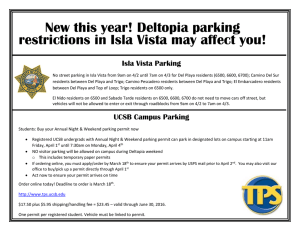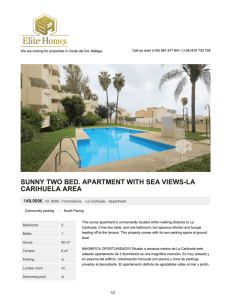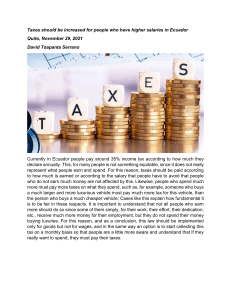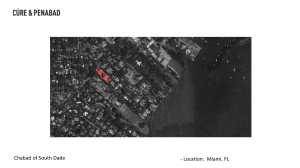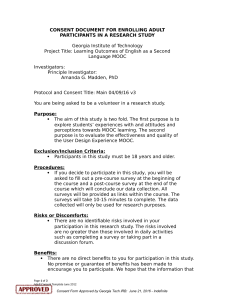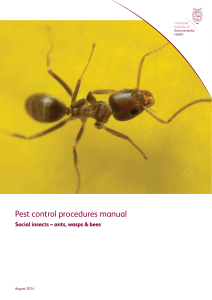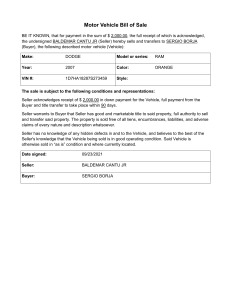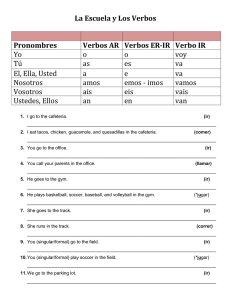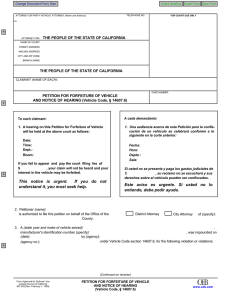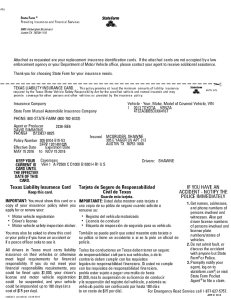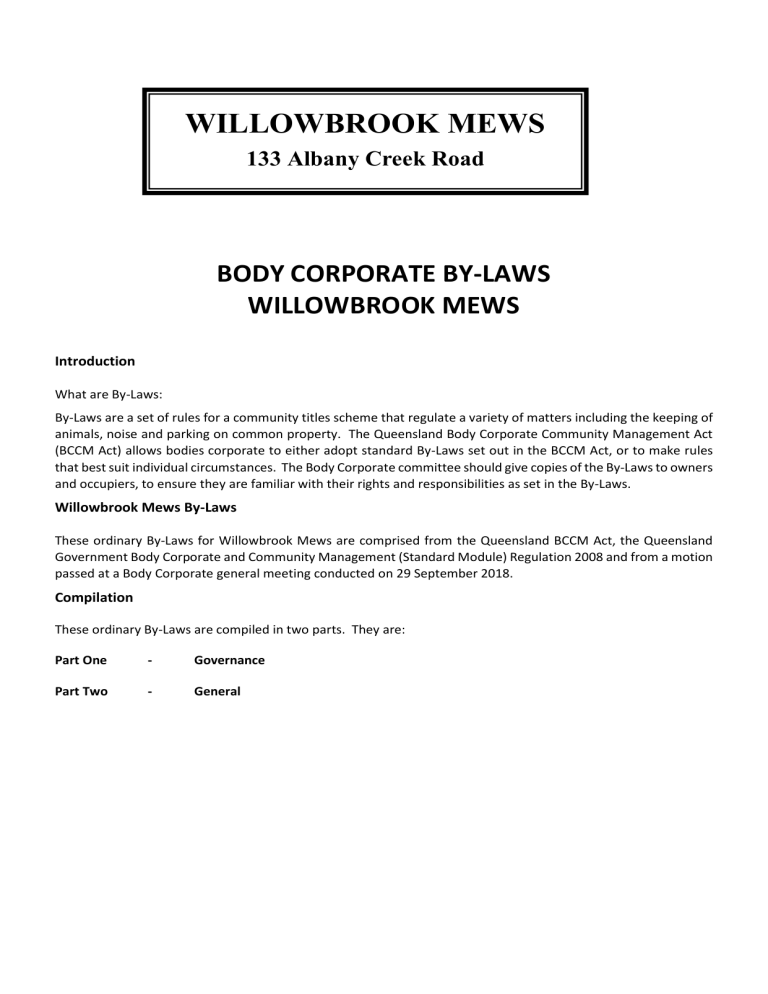
WILLOWBROOK MEWS 133 Albany Creek Road BODY CORPORATE BY-LAWS WILLOWBROOK MEWS Introduction What are By-Laws: By-Laws are a set of rules for a community titles scheme that regulate a variety of matters including the keeping of animals, noise and parking on common property. The Queensland Body Corporate Community Management Act (BCCM Act) allows bodies corporate to either adopt standard By-Laws set out in the BCCM Act, or to make rules that best suit individual circumstances. The Body Corporate committee should give copies of the By-Laws to owners and occupiers, to ensure they are familiar with their rights and responsibilities as set in the By-Laws. Willowbrook Mews By-Laws These ordinary By-Laws for Willowbrook Mews are comprised from the Queensland BCCM Act, the Queensland Government Body Corporate and Community Management (Standard Module) Regulation 2008 and from a motion passed at a Body Corporate general meeting conducted on 29 September 2018. Compilation These ordinary By-Laws are compiled in two parts. They are: Part One - Governance Part Two - General 2 PART ONE – GOVERNANCE BY-LAW 1. 1.1. COMMITTEES POWER TO EMPLOYEE AGENTS AND SERVANTS A committee may employ for and on behalf of the Body Corporate such agents and servants as it thinks fit in connection with the exercise and performance of the powers, duties and functions of the Body Corporate. Such agents and servants include but are not limited to tradespeople, gardeners and auditors. BY-LAW 2. 2.1. MEETINGS AND DELEGATION OF POWERS AND DUTIES The committee may: (a) Meet together for the conduct of business, adjourn and otherwise regulate its meetings as it thinks fit PROVIDED THAT it will meet when the Secretary, or in his/her absence, any member of the Committee at the request of not less than one-half of the members of the Committee gives, within the period of time, if any, specified in the request to the other members not less than seven days’ notice of a meeting proposed by him/her specifying the reason for calling such meeting and, where a member of the Committee other than the Secretary is requested to convene a meeting of the Committee under this By-Law, he/she may give, on behalf of the Committee, the notice required to be given under By-Law 3; (b) Subject to any restriction imposed or direction given at a general meeting, delegate to one or more of its members such of its powers and duties as it thinks fit and at any time revoke such delegation. BY-LAW 3. NOTICE OF COMMITTEE MEETINGS 3.1. A meeting of the committee is called by giving written notice to all other committee members stating where and when the meeting is to be held. 3.2. The notice must be given: (a) At least seven days before the meeting; or (b) At least two days before the meeting, if all voting members of the committee vote, at the last meeting of the committee held before the proposed meeting, in favour of the reduced notice period for the proposed meeting or agree in writing to the reduced notice period for the proposed meeting. BY-LAW 4. 4.1. VOTING IN WRITING BY MEMBERS OF COMMITTEE Where: (a) By-Law 3 has been complied with in relation to any meeting; (b) The committee has caused to be served on each member of the Committee a copy of any motion for a proposed resolution to be submitted at that meeting; and (c) Any such resolution has been approved in writing by a majority of the members of the Committee, The resolution shall, subject to Section 45(2) of the Act, be as valid as if it had been duly passed at a duly convened meeting of the Committee, notwithstanding that the meeting was not held. BY-LAW 5. 5.1. MINUTE OF CERTAIN RESOLUTION TO BE INCLUDED IN COMMITTEE’S MINUTES The Committee shall cause to be included in its minutes a minute of all resolutions passed pursuant to By-Law 4. 3 BY-LAW 6. 6.1. BODY CORPORATE MEETINGS Types of meeting; (a) All meetings of the Body Corporate are general meetings. (b) A general meeting is either an annual general meeting or an extraordinary general meeting. BY-LAW 7. NOTICE OF GENERAL MEETINGS 7.1. Written notice of a general meeting must be given to the owner of each lot included in the community titles scheme, and if not given personally, must be sent to the owner at the owner’s address for service. 7.2. The notice must state the time and place of the proposed general meeting. 7.3. The notice of a proposed general meeting must: (a) Be accompanied by a proxy form. (b) Contain an agenda for the meeting. (c) If the notice is given to the corporate owner of a lot, a form under which the owner may advise the Body Corporate of the corporate owner nominee. (d) Be accompanied by a voting paper for all open motions to be decided at the meeting. (e) Be accompanied by explanatory material required under section 73 of the regulation. (f) BY-LAW 8. 8.1. Contain or be accompanied by any other document as required under the Act or regulation. VOTING AT GENERAL MEETINGS A voter at a general meeting of the Body Corporate is an individual whose name is entered on the Body Corporate roll as: (a) The owner of a lot. (b) The representative of the owner of a lot. (c) The nominee of a corporation whose name is entered on the Body Corporate roll as the representative of the owner of a lot. (d) A corporate owner nominee. (e) A subsidiary scheme representative. BY-LAW 9. QUORUM FOR GENERAL MEETINGS 9.1. A voter is taken to be present at a general meeting if the voter is present at the meeting personally, by proxy or by written or electronic voting paper. 9.2. A quorum at a general meeting is at least 25% of the number of voters for that meeting. 4 PART TWO – GENERAL BY-LAW 10. NOISE 10.1. The owner or occupier of a lot, their guests, servants or agents shall not make or permit any noise likely to interfere in any way with the peaceful enjoyment of other owners or occupiers of lots or of any person lawfully using the common property. In particular no owner or occupier of a lot shall hold or permit the beheld any social gatherings in his/her lot which would cause any noise which unlawfully interferes with the peace and quietness of any other owner or occupier of a lot, at any time of the day or night and in particular shall comply in all respects with the Noise Abatement Act 1979, as amended. 10.2. Guests leaving after 11.00 pm shall be requested by their hosts to leave quietly. Quietness also shall be observed when an owner or occupier of a lot returns to the dwelling late at night or during early morning hours. BY-LAW 11. BEHAVIOUR OF INVITEES 11.1. The owner or occupier of a lot shall take all reasonable steps to ensure that his/her invitees do not behave in a manner likely to interfere with the peaceful enjoyment of the owner or occupier of another lot or of any person lawfully using the common property. 11.2. The owner or occupier of a lot shall be liable to compensate the Body Corporate in respect of all damage to the common property or personal property vested in it caused by such owner or occupier or their invitees. 11.3. The owner of a lot which is the subject of a lease or licence agreement shall take all reasonable steps, including any action available to his/her under any such lease or licence agreement, to ensure that any lessee or licensee or other occupier of the lot or their invitees comply with the provisions of the bylaws. 11.4. The duties and obligations imposed by these by-laws on an owner or occupier of a lot shall be observed not only by the owner or occupier but also by the guests, servants, employees, agents, children, invitees and licensees of such owner or occupier. BY-LAW 12. 12.1. VEHICLES The occupier or owner of a lot must not, without the consent in writing of the Body Corporate: (a) Park a vehicle other than which is described in 12.4. (a), or allow a vehicle to stand, in a regulated parking area other than which is described in 12.4. (b); (b) Without the approval of the Body Corporate, park a vehicle, or allow a vehicle to stand, on any other part of the common property; (c) Permit an invitee to park a vehicle, or allow a vehicle to stand, on the common property, except for the designated visitor parking which must remain available at all times for the sole use of visitors’ vehicles; (d) Allow a non-occupiers vehicle to be parked in a regulated parking area or on common property for vehicle minding purposes; or (e) Park or stand an unregistered vehicle, in a regulated parking area or common property. 12.2. For the purposes of By-Law 12.1. (e), the Body Corporate may approve parking pending vehicle registration action, for a period not exceeding 14 days. 12.3. The Body Corporate may cancel approval by giving 7 days written notice to the occupier. 12.4. For the purpose of By-Law 12.1. (a), 5 (a) A vehicle is described as being a sedan, a utility, a 4WD RV, a light commercial vehicle and, a motor cycle/motor scooter. No provision is made for parking of trucks, trailers, caravans or recreational watercraft on regulated parking areas or common property or any other area. (b) A regulated parking area means an area of scheme land designated as being available for use, by occupiers or invitees (visitor parking areas) of occupiers of lots included in the scheme, for parking of vehicles. BY-LAW 13. 13.1. PRIVATE ROADS AND OTHER COMMON PROPERTY The private roadway, pathways, drive and other common property and any easement giving access to the land shall not be obstructed by any owner or the tenants, guests, servants, employees, agents, children, invitees, licensees of an owner or any of them or used by them for any purpose other than the reasonable ingress and egress to and from their respective lots or the parking areas provided. An owner occupier of a lot shall not: (a) Drive or permit to be driven any motor vehicle in excess of two (2) tonnes weight into or over the common property other than such vehicles necessary to complete the construction and/or occupation of any residence erected on the land, and any motor vehicles entitled by any statute and/or local authority ordinances; (b) Permit any invitees vehicles to be parked on the roadway forming part of the common area at any time. Any invitees shall park their vehicles in the visitors’ parking bays on the common property and shall use such area only for its intended purposes of casual parking; (c) Permit any caravan, campervan or mobile home onto, over or throughout the common area or on the land of the owner unless the same is housed in a garage and is not visible from any part of the common area; (d) Permit any occupation of a caravan on a lot; (e) Permit the riding of skateboards, roller blades, carts or other similar means of transport on or over the common property, in driveways or on footpaths. The riding of bicycles on the roadways is permitted. BY-LAW 14. 14.1. VEHICLE SPEED For the safety and convenience of occupiers and invitees, a maximum speed limit of 10 Km/h is enforceable within the confines of Willowbrook Mews. BY-LAW 15. 15.1. OBSTRUCTION An owner or occupier of a lot shall not obstruct lawful use of common property by any person. BY-LAW 16. 16.1. DAMAGE TO LAWNS etc. ON COMMON PROPERTY An owner or occupier of a lot shall not: (a) Damage any lawn, garden, tree, shrub, plant or flower being part of or situated upon common property; or (b) Except with the consent in writing of the Body Corporate, use for his/her own purposes as a garden any portion of the common property. BY-LAW 17. 17.1. DAMAGE TO COMMON PROPERTY An owner or occupier of a lot shall not mark, paint, drive nails or screws or the like into, or otherwise damage or deface, any structure that forms part of the common property except with the consent in writing of the Body Corporate. 6 BY-LAW 18. 18.1. LEAVING OF RUBBISH etc ON THE COMMON PROPERTY An owner or occupier of a lot shall not deposit or throw upon the common property any rubbish, dirt, dust, or other material likely to interfere with the peaceful enjoyment of the owner or occupier of another lot or of any person lawfully using the common property. BY-LAW 19. 19.1. GARBAGE DISPOSAL An owner or occupier of a lot shall: (a) Save where the Body Corporate provides some other means of disposal of garbage, maintain within his/her lot, or on such part of the common property as may be authorised by the Body Corporate, in clean and dry condition and adequately covered a receptacle for garbage; (b) Comply with all local authority by-laws and ordinances relating to the disposal of garbage; and (c) BY-LAW 20. Ensure that the health, hygiene and comfort of the owner or occupier of any other lot is not adversely affected by his/her disposal of garbage. STORAGE OF FLAMMABLE MATERIALS 20.1. An owner or occupier of a lot shall not bring to, do or keep anything in his/her lot which shall increase the rate of fire insurance on any property on the parcel or which may conflict with the laws and/or regulations relating to fires or any insurance policy upon any property on the parcel or the regulations or ordinances of any Public Authority for the time being in force. 20.2. An owner or occupier of a lot shall not, except with the consent in writing of the Body Corporate, use or store upon his/her lot or upon the common property any flammable chemical, liquid or gas or other flammable material, other than chemicals, liquids, gas or other material used or intended to be used for domestic purposes, including gas barbecues, or any such chemical, liquid, gas or other material in a fuel tank of a motor vehicle or internal combustion engine. BY-LAW 21. 21.1. USE OF TOXIC CHEMICALS An owner or occupier of a lot shall not use any chemicals for cleaning or other purposes on common property, without the consent in writing of the Body Corporate unless: (a) Full product safety and usage information is followed; (b) All nearby residents are notified and have agreed; BY-LAW 22. 22.1. KEEPING OF ANIMALS The occupier of a lot must not, without the consent in writing of the Body Corporate: (a) Bring or keep an animal on the lot or the common property; or (b) Permit an invitee to bring or keep an animal on the lot or the common property. 22.2. The occupier must obtain the Body Corporate consent in writing before bringing, or permitting an invitee to bring, an animal onto the lot or the common property. 22.3. An animal must not behave in such a way likely to interfere with the peaceful enjoyment of another lot or someone else’s peaceful enjoyment of the common property. 22.4. An owner or keeper of an animal, must ensure the health and hygiene of the occupiers of other lots are not compromised. 22.5. For the purpose of this By-Law, a person mentioned in the Guide Dogs Act 1972, section 5, who is the owner or occupier of a lot has the right to keep a guide dog on the lot. Similarly, a person mentioned in the Guide Dogs Act 1972, section 5 who has the right to be on a lot included in the community titles scheme, or on the common property, has the right to be accompanied by a guide dog while on the lot or common property. 7 BY-LAW 23. USE OF LOT 23.1. An owner or occupier of a lot shall not use that lot or permit the same to be used for any purpose that may cause a nuisance or for any other purpose that may endanger the safety or good reputation of persons residing within the parcel. 23.2. An owner or occupier of a lot shall not operate or permit to be operated upon the parcel any radio, two-way radio, short wave radio, transmitter, telecommunications device or electronic equipment so as to interfere with any domestic appliance or apparatus (including a radio or television receiver) lawfully in use upon the common property or in any other lot. BY-LAW 24. 24.1. RIGHTS OF ENTRY An owner or occupier of a lot, upon receiving reasonable notice from the Body Corporate, shall allow the Body Corporate or any contractors, workmen or other person authorised by it, the right of access to his/her lot for the purpose of carrying out works or effecting repairs on mains, pipes, wires or connections of any water, sewerage, drainage, gas, electricity, telephone or other system or service, whether to his/her lot or to an adjoining lot. BY-LAW 25. 25.1. DIVIDING FENCES An owner of a lot shall not without the consent in writing of the Body Corporate erect any fence on the lot unless the same is of construction approved by the Body Corporate. BY-LAW 26. DAMAGE TO SHARED WESTERN BOUNDARY FENCE 26.1. An owner or occupier of a lot must not attach fixtures, structurally or otherwise alter or cause damage to the shared western boundary fence. 26.2. An owner or occupier of a lot must not allow foliage which has the potential to cause damage to come in contact with the fence. BY-LAW 27. APPEARANCE AND MAINTENANCE OF LOTS 27.1. The owner or occupier of a lot must not, without the consent in writing of the Body Corporate, make a change to the external appearance of the lot unless the change is minor and the change does not distract from the amenity of the lot and its surrounds. 27.2. The occupier of a lot must not, without the consent in writing of the Body Corporate: (a) Hang washing, bedding, or other cloth article if the article is visible from another lot or the common property, or from outside the scheme land: (b) Erect or display any other item or article if the item or article is visible from another lot or the common property: or (c) Display a sign, advertisement, placard, banner, pamphlet or similar article if the article is visible from another lot or the common property, or from outside the scheme land. 27.3. By-Law 27.2. (c) does not apply to a real estate advertising sign for the sale or letting of the lot if the sign is of a reasonable size. 27.4. The owner or occupier of a lot shall cause any lawns, gardens, paved or other areas within the lot to be kept in a neat and tidy condition and if at any time this By-Law is not complied with, the Body Corporate, upon 14 days’ notice to that owner or occupier, may cause the necessary work to be carried out and the reasonable cost of carrying out the necessary work shall be payable by the owner or occupier to the Body Corporate upon request. 27.5. The owner or occupier of a lot shall be responsible for the maintenance of his/her lot and shall ensure that the lot is so kept and maintained as not to be offensive in appearance to other lot owners or occupiers or from common property through the accumulation of excess rubbish or otherwise. 8 BY-LAW 28. ALTERATIONS TO LOTS AND COMMON PROPERTY 28.1. The owner or occupier of a lot shall not construct or permit the construction or erection of any fence, pergola, screen, awning, or other structure or outbuildings of any kind within or upon a lot or on common property without the consent in writing of the Body Corporate. 28.2. Any alteration made to common property or fixture or fitting attached to common property by any owner or occupier of a lot, whether made or attached with or without the approval of the Body Corporate, shall, unless otherwise provided by resolution of a general meeting or of a meeting of the committee, be repaired and maintained by the owner of the lot who made the alteration or attached the fixture or fitting to the common property. This By-Law shall be binding on the owner and the occupier of the relevant lot. 28.3. An owner or occupier of a lot shall not install an air conditioning system (“System”) to a lot without consent in writing of the Body Corporate. (a) The Body Corporate may approve the installation of System if: (i) The System is a “Split System: unit; (ii) The owner or occupier of a lot provides detailed installation drawings to the Body Corporate showing the proposed installation of the System and all associated ducting with technical details or the proposed System specifying noise levels; (iii) The owner or occupier of a lot acknowledges in writing its obligation to comply with the noise levels as defined in current Environmental Protection Authority Regulations; (iv) The installation of the System and all associated ducting and equipment is conducted in good and workmanlike manner that does not detract from the external appearance of the lot or the scheme land generally; (b) The owner or occupier of a lot shall be wholly responsible for all costs of and incidental to the System including: BY-LAW 29. 29.1. BY-LAW 30. 30.1. (i) Approval by the Body Corporate; (ii) Installation; (iii) Regular maintenance and repairs of the System; (iv) Replacement at the end of the System’s useful life; and (v) Insurance EXTERNAL COLOUR SCHEME An owner, mortgagee or occupier of a lot shall not, whether by himself, his/her servants or agents, alter the external colour scheme of any building of structure (including fencing) or part of a building or structure contained within that owner’s lot or on the boundary thereof without prior consent in writing from the Body Corporate pursuant to a resolution of the Body Corporate. RECOVERY OF RESTORATION COSTS Where the Body Corporate expends money to make good damage caused by a breach of the Act or of these by-laws by any owner or occupier of a lot or the guests, servants, employees, agents, children, invitees or licensees of the owner or occupier of a lot or any of the Committee, the Committee shall be entitled to recover the amount so expended (including solicitor and own client costs) as a debt in any action in any Court of competent jurisdiction from the owner of the lot at the time when the breach occurred. 9 BY-LAW 31. 31.1. RECOVERY OF LEGAL COSTS An owner (which expression shall extend to a mortgagee in possession) shall pay on demand the whole of the Body Corporate’s costs and expenses (including solicitor and own client costs) such amount to be deemed a liquidated debt, incurred in: (a) Recovering levies or moneys payable to the Body Corporate pursuant to the Act duly levied upon that owner by the Body Corporate or otherwise or pursuant to the by-laws of the Body Corporate; and (b) All proceedings including legal proceedings concluded in favour of the Body Corporate taken by or against the owner or the lessee or occupier of the owner’s lot, including but not limited, applications for an order by the Commissioner, an Adjudicator and appeals to the Court. 31.2. In the event that the owner (or his/her mortgagee in possession) fails to attend to the payments of such costs and expenses after demand is made for the payment of same, the Body Corporate may: (a) Treat such costs and expenses as a liquidated debt and take action for the recovery of same in any Court of competent jurisdiction; and (b) Enter such costs and expenses against the levy account of such owner in which case, the amount of same shall be paid to the Body Corporate upon a subsequent sale or disposal of the owner’s lot failing which the purchaser of such lot shall be liable to the Body Corporate for the payment of same. BY-LAW 32. 32.1. BY-LAW 33. 33.1. BY-LAW 34. 34.1. BY-LAW 35. 35.1. BY-LAW 36. COMMUNICATION An owner or occupier of a lot shall direct all complaints, applications or requests for consideration on a particular matter to be referred to the committee or to the Body Corporate, in writing to the Secretary and not to the Chairperson or any member of the Committee. INSTRUCTIONS TO CONTRACTORS An owner or occupier of a lot shall not directly instruct any contractors or workmen employed by the Body Corporate unless so authorised. AUCTION SALES An owner or occupier of a lot shall not permit any auction sale to be conducted or to take place in his/her lot or in the dwelling or upon the parcel without the prior consent in writing of the Body Corporate Committee. HAWKERS AND CANVASSERS The owner or occupier of a Lot shall not invite, encourage or knowingly permit hawkers or canvassers onto the common property without the consent in writing from the Body Corporate. EXCLUSIVE USE OF COURTYARD 36.1. The owner for the time being of Lot 29 shall be entitled to the exclusive use and enjoyment of that part of the common property as allocated in Schedule E and designates as courtyard identified on the sketch plan annexed hereto and marked with the letter “A”, the owner for the time being of Lot 29 being responsible to keep that area in a clean and tidy condition and shall be responsible for the maintenance, cleaning, mowing, tidying and if necessary, replanting of all lawns and all other landscaping and other improvements located within that area. 36.2. In the event that the owner for the time being of Lot 29 shall fail in his/her responsibilities in this regard, the Body Corporate shall be at liberty to attend to same in such manner as the Body Corporate shall deem fit and to recoup as a liquidated amount such expenditures from the owner for the time being of Lot 29. 10 SCHEDULE E DESCRIPTION OF LOTS ALLOCATED EXCLISIVE USE AREAS OF COMMON PROPERTY Lot 29 on GRP 104909
